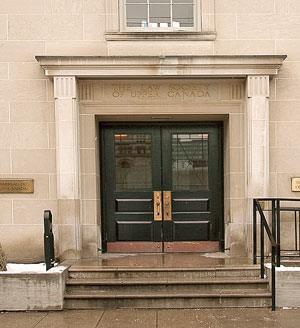The Law Society of Upper Canada has revoked the licence of a lawyer for misapplying $2.6 million he received in trust from real estate transactions.

A discipline tribunal found lawyer Andrew Tulk misled and failed to serve his clients on nine real estate transactions.
In a scheme that spanned roughly five years, Tulk used the funds that he had received for real estate purchases to keep his failing practice afloat, according to the tribunal’s decision in
Law Society of Canada v. Tulk.
“Mr. Tulk’s law practice was running at a loss. He simply decided he would continue operating it as he saw fit,” the decision said.
“As he described it to us, he set up a scheme whereby he covered any new losses by treating his trust account as if it were a business account.”
When his practice fell into a $400,000 hole, Tulk started using trust monies to pay off personal living expenses and the operational costs of his firm.
He shuffled funds in a “ponzi” or “shell game” in order to cover up the trust losses that were accumulating and used client advances and mortgage advances to pay off a previous mortgage so that “the money was completely rolling over and over and over again,” the decision said.
Tulk is also facing criminal charges, according to the decision, which include two counts of fraud, one count of breach of trust and one count of using a forged document.
The law society first received a complaint concerning one of these transactions from one of Tulk’s clients in 2012. She said the lawyer had failed to discharge an outstanding mortgage in a timely manner.
The LSUC then launched an investigation into Tulk after receiving a letter in 2013 from a lawyer at Tulk’s firm, identified in the decision as “CB”, who was also the daughter of the client who made the original complaint.
CB had confronted Tulk after overhearing some clients accusing the lawyer of stealing their money. In that confrontation, Tulk “. . . acknowledged that out of bitterness for the way the Law Society has treated him over the years,” he had been committing mortgage fraud for five years and using the funds to run the firm.
It was after this confrontation that CB sent her letter.
When a law society investigator met with Tulk at his office, he gave her 10 signed cheques with more than $2.6 million related to the nine real estate transactions and said he did not have the money in trust to cover them. He claimed he had been using clients’ trust funds to prop up his practice, which had been operating at a loss for years.
Tulk, who was called to the bar in 1970, denied committing mortgage fraud at hearings, but he also openly acknowledged that he had been deliberately misappropriating funds.
It was not the first time Tulk has faced discipline proceedings, as he was also suspended for six months in 1993 for personal misconduct.
He was also reprimanded in 2009 for making inappropriate and abusive comments to opposing counsel.
Over the course of the recent hearing, Tulk said he had been treated unfairly by the law society in these two previous proceedings. He described the decisions as “dead wrong” and that they had affected his ability to make a living.
“Nothing said on these points justified his outrageous and egregious actions,” the decision said about the grievances he expressed about the law society.
When his practice fell into financial trouble, Tulk considered closing it, but he decided “the hell with it” and started using trust monies to prop it up, according to the decision. In the hearings, Tulk said he considered this a way of “fighting back” or waging “warfare with the Law Society.”
In addition to the finding that Tulk had missaplied $2.6 million, the tribunal panel also determined that the lawyer had also misapplied an additional $12,657 in trust monies that were paid into his trust account from a holdback for repairs on a real estate sale and money secured as a settlement payment in a civil lawsuit.
The law society panel found that revoking a lawyer’s licence is the appropriate penalty in misappropriation cases except in exceptional circumstances.
The panel determined that Tulk had not suffered from “an isolated lapse of judgment” and that he had admitted he knew he would eventually be disbarred when he started the misappropriation scheme years ago.
“In his penalty submissions, Mr. Tulk acknowledged that he regretted what he had done,” the decision said. “He described it as both stupid and wrong. However, at the same time he stated that at ‘another level’ he wished that he had been able to carry on longer.”
In addition to disbarring Tulk, the law society ordered him to pay $30,000 in costs.
A spokeswoman for the law society said the regulator’s position was set out at the hearing.
Tulk could not be reached for comment.

 A discipline tribunal found lawyer Andrew Tulk misled and failed to serve his clients on nine real estate transactions.
A discipline tribunal found lawyer Andrew Tulk misled and failed to serve his clients on nine real estate transactions.